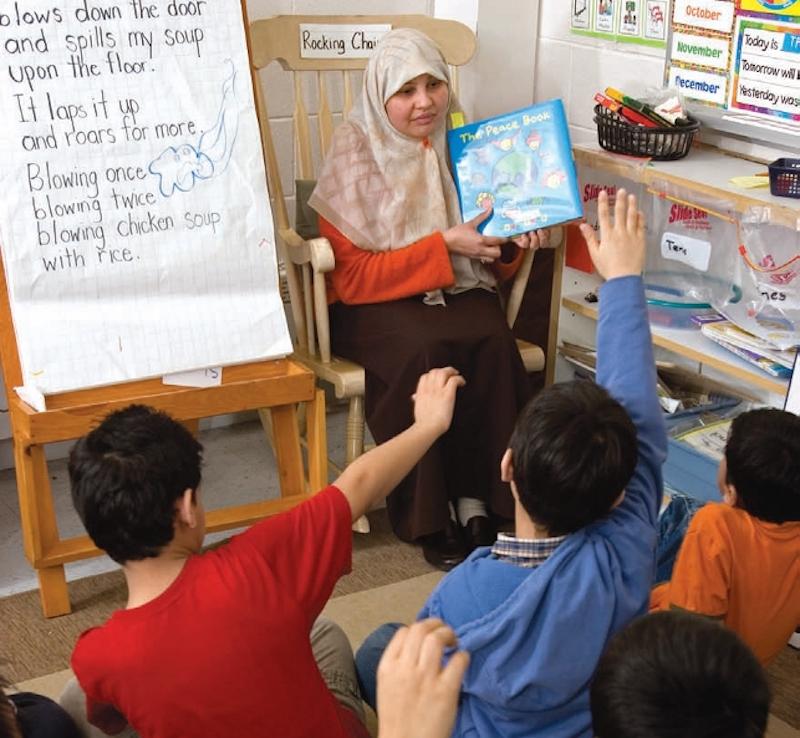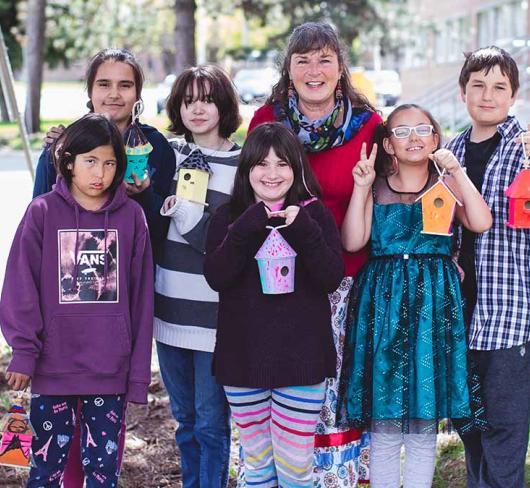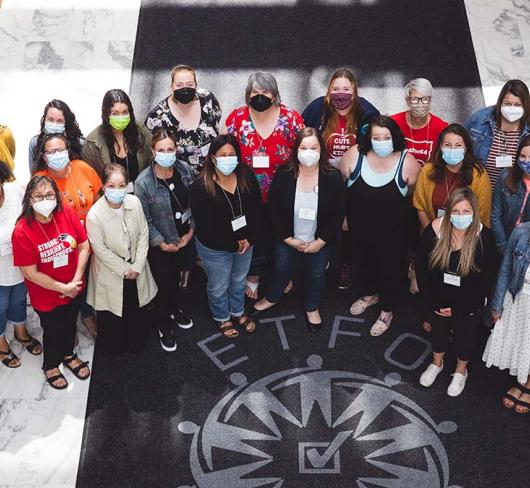
Professional Learning Communities Sharing Knowledge and Leadership: Building a Global Professional Learning Community
A wonderful opportunity presented itself a couple of years ago when I applied to take part in Project Overseas. This is an excellent professional learning opportunity where teachers can learn and teach at the same time, while they help to build a global professional learning community.
The journey began with filling out the application that is available on the ETFO website. The application, along with the phone interview, gave me an opportunity to describe my strengths and ability to work with others. A couple of months later, I learned I would be travelling to Sierra Leone with three other teachers from across Canada.
Community building started well before departure. Our team leader helped bring us together through emails and phone calls. Each of us brought his or her own expertise, and we divided the task of preparing for the project. We contacted the team from the previous year and connected with the Sierra Leone Teachers Union to get help with planning.
Our first face-to-face meeting as a team was a couple of days before our departure for Sierra Leone. The Canadian Teachers’ Federation brought all 49 Project Overseas participants from across Canada to Ottawa for a three-day orientation that helped prepare us for the experience. Along with attending excellent workshops, we had opportunities to hear from previous participants and to meet Canadians who had lived in Sierra Leone.
Upon our arrival in Freetown, Sierra Leone, we were greeted by several representatives of the Sierra Leone Teachers’ Union. We worked together to plan a program to best meet the needs of the teachers we would be working with, teachers who had not had the opportunity to go through any professional training. The teachers would be with us for two weeks of intensive work. We would then have a week of travel and visits within Sierra Leone, followed by another two weeks with a new group of teachers.
Our day started with having breakfast with all of the participants. This was a great time to network and get to know each other. We then formed two groups of about 20 participants each. We had two sessions before lunch and two after. Each of us worked with a local teacher leader to facilitate workshops on teaching English, math, social studies, and science. We also presented sessions on HIV/AIDS, gender equity, workshop presentation, and peace education, modelling teaching strategies as we conducted the workshops.
Participants had a chance to work together to prepare lessons that they could take back and use in their classrooms.
At the end of the day we met as a whole group to reflect, and the official part of our working day ended. (The local participants, however, contin- ued with a session about the Teachers’ Union.) In the evening there were several opportunities to socialize and get to know each other better.
Every day we learned a great deal from each other. We were welcomed with warmth and appreciation. The participants, initially shy because they were not accustomed to an interactive model of education, slowly started actively participating and sharing. Their stories spoke of their resilience and survival during the course of the country’s civil war. From 1991 to 2000, the people of Sierra Leone lived in turmoil as rebel forces clashed with the government in a bid to control the sale of diamonds. The recently released film Blood Diamonds sheds some light on what happened there. Due to the war, many teachers had had their own education interrupted, and they were eager to spend every minute learning and making the most of their experience.
For the Canadian team, flexibility was the key to this rewarding experience. We realized quickly that some of the ideas we had brought along for cooperative work would not be suitable in the kinds of classrooms our participants worked in– classrooms of between 80 and 100 students confined in a small space. Most classrooms had only one chalkboard and, if the teacher was lucky, a few pieces of chalk. We slowly started adapting our lessons to the environment. For instance, we started using soda bottle caps to make counters to help with math.
Along with many rewarding experiences, we faced some challenges. One of the biggest was trying to gear our workshops to the curriculum the teachers had to follow, even if we did not agree with the content or the methodology used. We also had to learn to adapt and be flexible. Things were not as organized as we were used to. Being away from familiar surroundings and not having much personal space was difficult for some Project Overseas participants.
We felt helpless at times, realizing that we could not change much and would be gone in a couple of weeks. We had to remind ourselves that by working together we were creating bonds that would continue to grow through the years. I wondered sometimes if our few short weeks could have any impact. A recent letter assured me that they did. A participant wrote: “Although I am not yet a qualified teacher, the knowledge of teaching methods I obtained from you have qualified and fortified me to carry out my work positively.”
This project helped me realize the impact our teacher unions have. They work together to equip teachers to educate themselves and others. I found myself wanting to learn more and get further involved with the federation. Many of the federation committees and professional learning opportunities provide a platform to collaborate with colleagues and to continue to work and learn together.
Participating in Project Overseas has had a profound impact on my life. The lessons I have learned I could not have learned anywhere else. This experience has broadened my professional knowledge and allowed me to better appreciate the needs of my many newcomer students, especially those who have survived hardships before their arrival to Canada. I share the knowledge I gained with other teachers, and together we advocate for the needs of others. We look for ways to fundraise and help.
Our Canadian team continues to keep in touch. Being so far from home, we were each others’ pillars of support. We appreciated each other and learned from each other personally and professionally. We share different heritages and joke about how we had to go to Sierra Leone to appreciate the diversity within Canada.
ETFO Policy Statement: Professional Learning Community
A That a group of education professionals who share common visions, values, and goals, and work collaboratively using inquiry, experimentation, and innovation to improve teaching and student learning be described as a Professional Learning Community.
- A That teacher participation in a Professional Learning Community be voluntary.
- A That a culture of collegiality and respect for member professionalism and autonomy be fostered by a Professional Learning Community.
- A That a teacher’s ability to generate knowledge regarding teaching and learning be recognized by a Professional Learning Community.
- A That all aspects of the functioning of a Professional Learning Community be based upon an evidence-based, shared decision-making model.
- A That teacher empowerment and leadership development be integral components of a Professional Learning Community.
- A That professional development opportunities during the school day on the role and function of a Professional
- Learning Community be provided by district school boards prior to and throughout the development of a Professional Learning Community.
- A That funding for a Professional Learning Community to access professional learning opportunities and resources,
- and enable teachers to meet and collaborate during the school day, exclusive of teacher preparation time and
- nutrition/lunch breaks, be provided by district school boards.
- A That provision for teacher self-directed learning be included in any professional development associated with a
- Professional Learning Community.
- A That all areas of the curriculum, with emphasis on the development of the whole child, be included in the
- objectives of a Professional Learning Community.
- A That no aspect of teacher participation in a Professional Learning Community be used for teacher performance appraisal.

